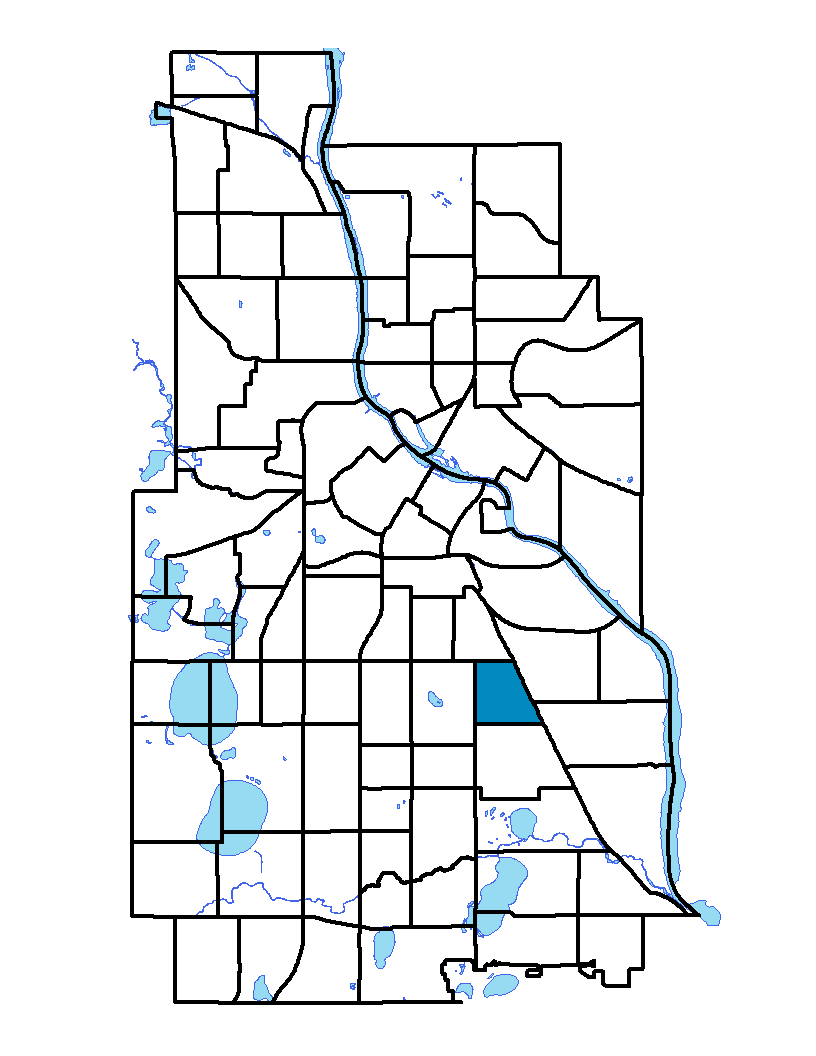Corcoran neighborhood, just east of Powderhorn Park, is between Lake Street East and 36th Street East and between Cedar Avenue South and Hiawatha Avenue. Named in honor of William Wilson Corcoran (1793-1889), who founded the Corcoran Gallery of Art in Washington D.C., this is a mainly residential neighborhood – more than 60 percent of the land is used for single-family residences. The light-rail stop at Lake Street gives the neighborhood an easy connection to Downtown, the Minneapolis-St. Paul International Airport and the Mall of America. In addition, plans to develop the Lake Street corridor as a commercial thoroughfare are under way, and will have an important local impact.
To learn more about the neighborhood association visit: www.corcoranneighborhood.org
Indicator Details
|
Indicators |
Primary Domain | Indicator Value | Rank | Tier |
|---|---|---|---|---|
| Access to Mainstream Financial Services | Economic Health | 30.0% | 54 | Middle |
| Access to Parks and Open Space | Natural Areas | 1.1% | 75 | Bottom |
| Adult Educational Attainment | Educational Opportunities | 84.7% | 55 | Middle |
| Age of Housing | Housing | 87.9% | 47 | Middle |
| Blood Lead Levels in Children | Housing | 5.5% | 55 | Middle |
| Business Retention | Economic Health | 3.5% | 27 | Top |
| Chronic School Absence | Health Systems and Public Safety | 49.9% | 28 | Top |
| Commute Mode Share | Transportation | 37.3% | 23 | Top |
| Employment Rate | Employment Opportunities | 66.0% | 58 | Middle |
| Excessive Housing Cost Burden | Housing | 27.5% | 37 | Middle |
| Food Desert | Neighborhood Characteristics | 50.0% | 11 | Top |
| High School Graduation Rate | Educational Opportunities | 70.0% | 3 | Top |
| Household Transportation Costs | Transportation | 16.8% | 42 | Middle |
| Local Business Vitality | Economic Health | 55.3% | 42 | Middle |
| Long-Term Unemployment | Employment Opportunities | 7.5% | 63 | Bottom |
| Low Birth Weight | Health Systems and Public Safety | 7.5% | 45 | Middle |
| Motor Vehicle Collisions | Health Systems and Public Safety | 47.9 | 80 | Bottom |
| Offsite Alcohol Outlets | Neighborhood Characteristics | 1 | 6 | Top |
| Pedestrian Connectivity | Transportation | 101.4 | 66 | Bottom |
| Preschool Enrollment | Educational Opportunities | 41.0% | 54 | Middle |
| Preventable Hospitalizations | Health Systems and Public Safety | 1.9 | 32 | Middle |
| Proximity to Brownfield Sites | Environmental Hazards | 3.6% | 37 | Middle |
| Proximity to Superfund Sites | Environmental Hazards | 41.1% | 58 | Middle |
| Public Assisted Households | Employment Opportunities | 33.2% | 63 | Bottom |
| Reading Proficiency | Educational Opportunities | -% | - | Data N/A |
| Residential Mobility | Social Cohesion | 77.7% | 49 | Middle |
| Residential Proximity to Traffic | Environmental Hazards | 14.3% | 52 | Middle |
| School Proximity to Traffic | Environmental Hazards | 0.0% | 1 | Top |
| School Readiness Scores | Educational Opportunities | -% | - | Data N/A |
| Toxic Releases from Facilities | Environmental Hazards | 0.0% | 1 | Top |
| Transit Accessibility | Transportation | 280.2 | 50 | Middle |
| Travel Time to Work | Employment Opportunities | 21 minutes | 22 | Top |
| Tree Cover | Natural Areas | 25.9% | 68 | Bottom |
| Vacancy Rates | Housing | 9.7% | 56 | Middle |
| Violent Crime | Health Systems and Public Safety | 70.3 | 65 | Bottom |
| Voter Participation | Social Cohesion | 26.8% | 42 | Middle |
| Walkability | Neighborhood Characteristics | 69 | 28 | Top |

